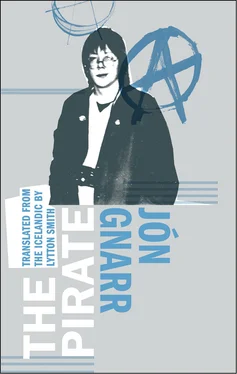After I was sent back to town and the meeting at Vatnaskóg was over, the good boys were able to have peaceful, curse-free days with the Christian Studies teacher. They didn’t have to worry about anything because the Antichrist had been sent back to town and his mother had been notified.
There was an odd atmosphere about the management of Réttarholt School, Bústaðir Church, and Bústaðir. The guys who ran these places struck me as peculiar and almost alarming. I felt like they were connected in some mysterious way. Maybe they were just friends. I had my suspicions that they were all in some secret clique that held meetings late at night. At the meetings, they decided who was important and who wasn’t, who mattered and who should be left out, and — what was most frightening — who ought to be hounded out. Kids who were beautiful and well-behaved at school and played sports were the best. They were deemed important. Kids who knew how to dance were also important. I wasn’t good at any of that stuff. Me and my kind were unwelcome. I was unimportant. These guys were in charge, and the kids obeyed. I felt their power everywhere: at school, in preparation for Confirmation, in the community. And I felt that these guys were somehow disagreeable. Hitlers. There was something about them and their presence that was so uncomfortable: how they moved, how they talked and watched. I could feel no warmth in their eyes, just hardness and arrogance. And I was not the only one who felt this because it was widely talked about. Even the beautiful and the well-behaved kids objected to them. But none of us really understood why. You couldn’t talk about it too loudly; you needed to be careful who might hear you. No one wanted to say something that somebody would then rat out to the guys. It all happened in whispers. You’d hear claims of strange goings-on and didn’t always know what was true and what was an exaggeration or a fabrication. It was whispered that the priest was a pervert. Was he? The girls said he was a creep. I didn’t quite know what it meant to be a creep, but it was obviously not a good thing. It was said that he sometimes fondled the girls, their breasts, and said lousy things to them, that they were beautiful or something like that. All this was reported in greatest confidence. I dared not ask anything more about it. I found sexual intercourse awkward enough a topic. I didn’t quite know what to make of having your breasts fondled. But I thought it was weird that some old guy would do it — especially a priest. Don’t priests have to be good? And he didn’t ask for permission. I would never fondle someone’s breasts without permission. But it was almost a source of embarrassment. Awkward. You just got a sense that things were not as they should be. Disgusting guys. I thought the guy at Bústaðir was a creep. An old man who liked to dance. These men didn’t like me, and I didn’t like them. They looked at me askance, and I was wary of them. But they were careful to leave me alone and had few direct dealings with me; they just allowed the other kids to do it for them. They probably sat for hours with those kids behind closed doors and talked about how much of a loser I was, saying they should make fun of me and drive me off. They knew full well the bullying and violence that took place. They had seen it time and again with their own eyes, but they didn’t care. It was what they wanted, and I knew they were hiding something.
When I was a kid, I believed in God. Grandma taught me. She taught me the Lord’s Prayer and talked a lot about God. She also told me that God watched over me, thought about me, and loved me and that I should diligently pray to him. I had absolutely tried to pray to God on several occasions but felt he didn’t concern himself with me. I didn’t exactly doubt his existence but reckoned he had more important matters to consider than me. It meant nothing to ask for protection from God. Once, for example, I had a really terrible toothache the day before my birthday, and I lay praying, asking God to stop me having the toothache on my birthday. I prayed and hoped, but he saw no reason to grant my wish. He felt it was okay if I had a toothache on my birthday. I didn’t really think much about God; he was just somehow there with Grandma. And when Grandma died, he left my life. Punks weren’t impressed by God. They were outright against him and even claimed that God didn’t exist up there above our heads. Punk was partly about challenging Christian and civic values.
What, however, had the greatest impact on me were God’s representatives on earth. These people I found all had one thing in common: they were no fun. I thought these people humorless and odd in equal measure. No one who listened to God listened to punk. But Confirmation is Confirmation. And Confirmation meant a party. And a party meant gifts. It felt very tempting. I was always willing to do anything for money. Anything to avoid being dependent on my father. I reasoned that by getting confirmed I might make some money to buy some albums and even possibly a tape recorder. I didn’t have one. The only music player at home was the combination Crown record player inside the living room. And Mom insisted I get confirmed. I tried to talk to her but she wasn’t prepared to discuss it any further. She had made her decision. That was that.
“I’m not sure I want to get confirmed.”
“No! For shame!” Mom said.
“No, I’m not sure I believe in God.”
She snorted at that. For her, it had nothing to do with God.
“Confirmation is just Confirmation and you will get confirmed!”
“But why should I get confirmed if I don’t believe in God?”
“That doesn’t matter. You will get confirmed. It isn’t up for debate. All your siblings have been confirmed and you will be confirmed too.”
It was impossible to draw Mom into any religious discussion or a back-and-forth about higher powers. It simply didn’t concern her. I didn’t want to discuss it with my dad. I knew he was an atheist and bore a grudge against priests because I had often heard him talk about it. Þórbergur Þórðarson also had a significant influence on my religious beliefs. I had read Letter to Lara and The Prodigy and knew that Þórbergur had serious doubts about the existence of God or any higher power. It was odd, though, that he nevertheless seemed quite open to supernatural creatures like elves and to energies beyond death. He believed in ghosts but not God. I didn’t really know if I believed in ghosts, but I was afraid of the dark. I didn’t know exactly what I feared in the darkness, whether a ghost or something else. I often reflected on Þórbergur’s spiritual mentality. My father was a committed communist. For him, God was nothing but an opiate for people. A tool capitalism used to soothe the masses and keep them quiet so they would rather pray to God than insist on wage increases and better working conditions. God also wanted people to be happy just being poor and not living in decent housing. Believers had nothing to worry about, even though their lives were miserable, because the more dreariness in this life, the better they would have it in the afterlife. For Mom, belief was just part of normal life and Confirmation a formality. It was a custom, like birthdays.
I agreed to be confirmed and started going to the priest. I hung out with Eiki the Druggie there. I enjoyed messing about in church and took my chance when the kids were all there but before the priest showed up. I talked about God and the nature of divinity.
“Do you believe God is real?”
“I absolutely believe in God,” said one of the girls.
“So we’re in a church. What do you think God would say if I said ‘damn devil hell’ here in the church?”
The kids were completely shocked by me. The church had great acoustics, so everything I said echoed.
Читать дальше











